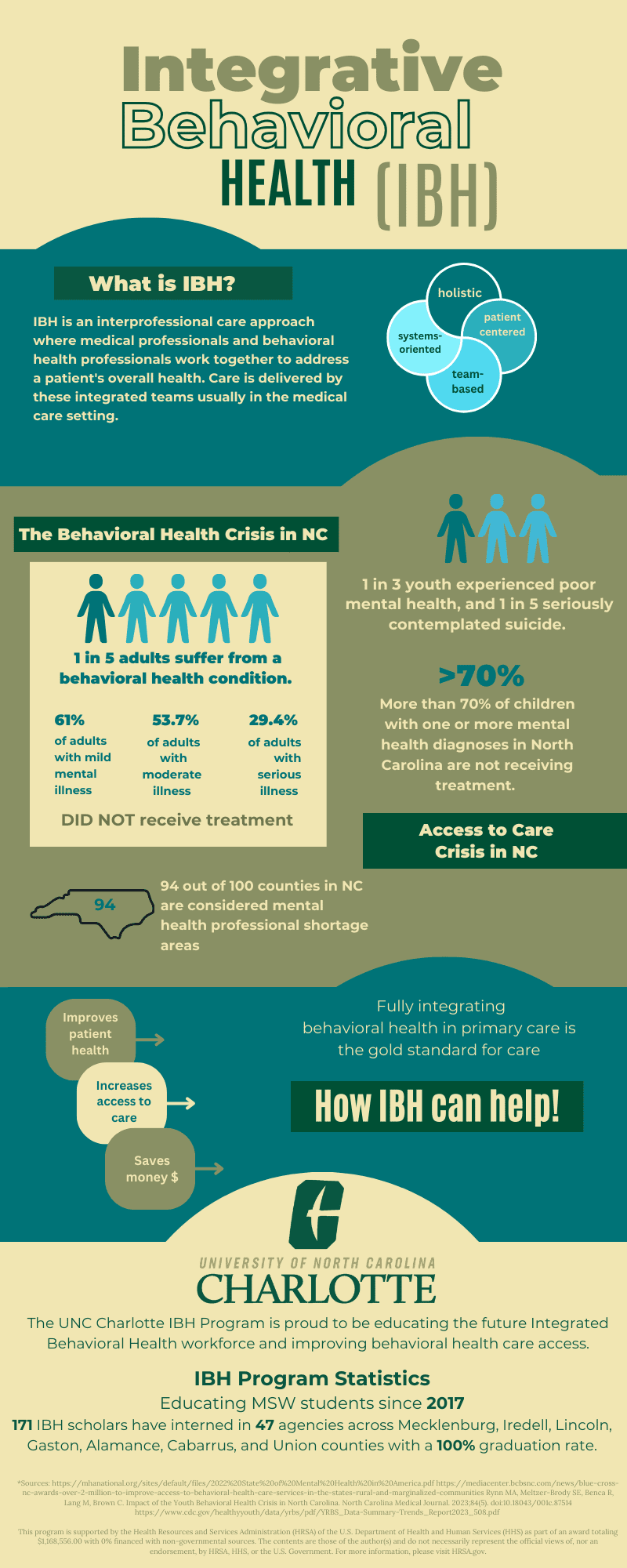Our Program
Our Program
Transformational changes are happening within healthcare in the United States. Healthcare systems are working to increase access, improve quality, and reduce cost. Integrated Behavioral Health (IBH) models of care include evidence-based approaches that can reduce service barriers, improve patient mental and physical health, and provide greater cost-effectiveness in health care utilization (Woltmann et al., 2012; Katon et al., 2010; Melek et al., 2014). UNC Charlotte is training clinical social workers to meet these challenges.
An estimated 46.6 million people in the U.S. experience mental health concerns each year; however, less than half (41%) actually receive behavioral health services (NAMI). 56 percent of those individuals treated are receiving services from a primary care provider rather than a trained behavioral health specialist (44%) (Kessler et al., 2005). IBH services bring specialized services to patients seeking care in settings that are familiar and destigmatizing.
IBH is an interprofessional care approach where medical and behavioral health professionals work together to address patients’ overall health. IBH is holistic, patient-centered, team-based, and systems-oriented. The Health Resources and Services Administration (HRSA) recently invested over $146 million for integrated behavioral health workforce development. Beginning in 2017, the UNC Charlotte School of Social Work originally received a four-year $1.8 million award to offer student stipends, interprofessional curriculum, enhanced training, and community education in 2017. The UNC Charlotte School of Social Work IBH Team working collaboratively with our community partners submitted a successful HRSA BHWET Grant Application and received continuation funding for four additional years. UNC Charlotte was notified over the summer that the application was successful and that we received renewal funding for our Integrated Behavioral Health Program. The focus of the HRSA BHWET Grant for the next four years is on high need children, adolescents, and transitional aged youth.
What does the UNC Charlotte IBH Program do?
The UNC Charlotte IBH Program is proud to be educating the future integrated behavioral health workforce and improving behavioral health care access regionally. Our program has four primary goals:
1. Develop MSW training and curricula that addresses IBH needs and reflects emerging innovation and evidence-based practice (EBP) models;
2. Create robust, well-supported IBH field placements within health care settings;
3. Establish highly desired placement opportunities for health care organizations and MSW students; and
4. Leverage unique opportunities to document community need, evaluate program effectiveness, and develop research studies
We invite you to learn more about our training, partnerships, and evaluation/research activities.
Before applying, please read over the detailed expectations and job description here.
This project is supported by the Health Resources and Services Administration (HRSA) of the U.S Department of Health and Human Services (HHS) under grant #2 M01HP31390-05-00 Behavioral Health Workforce and Education Training Grant
Introduction to IBH Program



